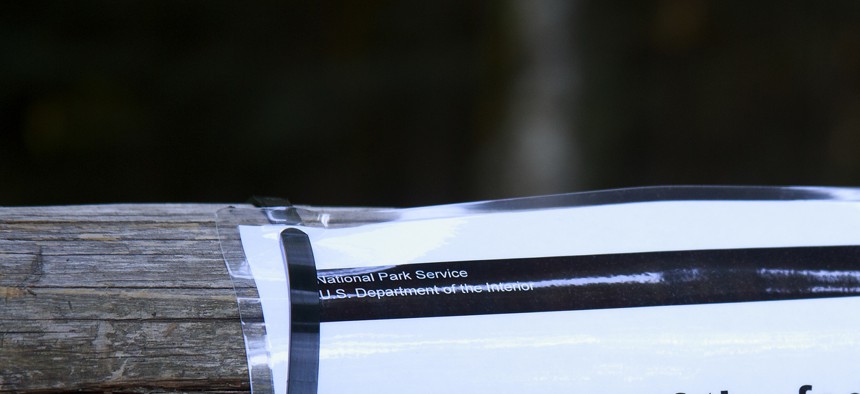
Mount Rainier National Park taped up signs in October 2013. National Park Service
An Unhappy Anniversary to the Government Shutdown and Healthcare.gov
With the midterm congressional elections just over a month away, both parties are using the milestone to refresh voters' memories.
Democrats and Republicans are each shouting "Happy anniversary!" on Wednesday, but being true to form, they are commemorating different milestones.
The start of October marks one year since the federal government shut its doors amid a partisan budget fight, a damaging political misstep for Republicans that Democrats hoped would hand them control of the House this fall.
Those dreams were fleeting, however, because while the government was shuttered, Healthcare.gov was launching ... or trying to. The disastrous debut of the centerpiece of President Obama's signature law didn't gain widespread attention until after the government reopened in mid-October, but the initial failure of the federal insurance exchange website sapped any political advantage Democrats had reaped from the 16-day shutdown.
A year later, with the world once again roiled by war, all that's left of the domestic skirmishes are dueling reminders of crises past.
Representative Nancy Pelosi, the House Democratic leader, highlighted the shutdown's birthday during a morning press conference at the Capitol, while her Democratic colleagues are flooding inboxes and Twitter feeds with blasts targeting Republican dysfunction.
The Democratic Congressional Campaign Committee launched a website called GOP Time Flop , which it called "a time capsule of this Republican Congress, bringing you your worst memories, delivered daily."
Not to be outdone, the National Republican Senatorial Committee sent around a video mashup of Obama and targeted Senate Democrats delivering their infamous promise that if people liked their healthcare plan, they "could keep it."
Yet the fact that the parties have to resort to reminders at all is a testament to the rapid-fire modern news cycle and the cascade of crises that have buffeted domestic and global politics in the year since the shutdown and Obamacare dominated the headlines.
Just this past summer alone, racial unrest in Ferguson, a war between Israel and the Palestinians, the Russian invasion of Ukraine, and the outbreak of Ebola have flown on and off the national radar. And that list doesn't include the story that trumps them all: The menacing advance of Islamic State terrorists in Iraq and Syria prompted Obama to launch a new military offensive to stop them.
It's also a reflection that neither the economy nor the healthcare law fared as poorly as the parties warned. The Obama administration exceeded its target of 7 million health insurance enrollees by the spring, and after a bumpy start to 2014, the economy bounced back to record a 4.6 percent annualized rate of growth in the second quarter.
Polling suggests that the effect that the shutdown and the Healthcare.gov fiasco had on the president and the two parties was more fleeting than lasting. Obama's approval rating in the Gallup tracking poll stands at 43 percent , nearly identical to the 44 percent that was registered on Sept. 30, 2013. The favorability rating of the GOP plummeted to a record low of 28 percent during the first week of the shutdown a year ago, but it now stands at 40 percent, according to Gallup, which is similar to where the party was before the budget impasse.
Republicans correctly point out that the healthcare law remains broadly unpopular, but in an indication that it is not as toxic as it once was, the party's candidates are not vowing to repeal it nearly as much as they did in recent elections.
While the two events may have faded from the front of voters' minds, they each have contributed to a more lasting impression of Obama and the GOP, said Julian Zelizer, a political scientist at Princeton University.
Both the shutdown and the Obamacare rollout galvanized Tea Party Republicans, confirming their anger at the president and what they see as his disastrous experiment in big government. Just as polls show voters hold the GOP brand in low regard, they also show that Republican voters are more likely to show up in November.
At the same time, for more centrist and liberal voters, the shutdown may have reinforced the sense that the GOP is dominated by the Tea Party and incapable of governing, Zelizer said.
"It's part of the way they think of the Republican Party," he said. "This whole idea of Republican extremism stems from that moment."
For both parties, then, the impact of last fall's drama endures, even if it's not much of a cause for celebration.
NEXT STORY: No Joke, Here's How to Fix the Secret Service






